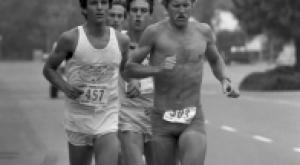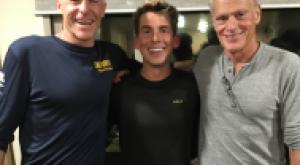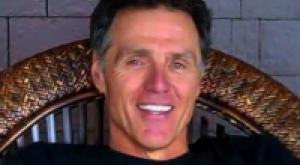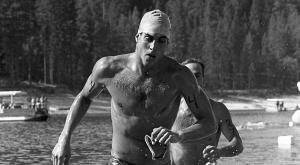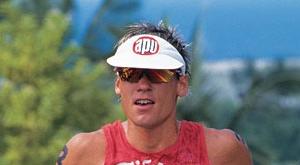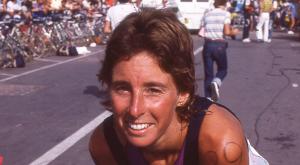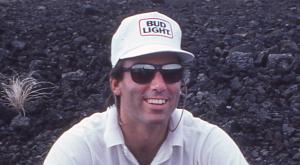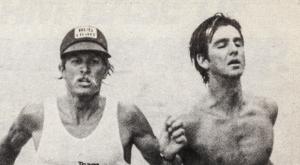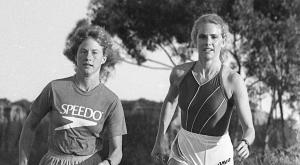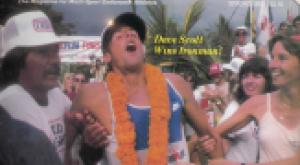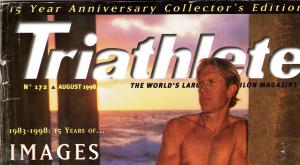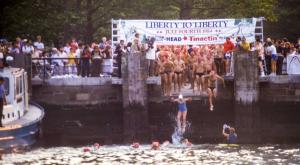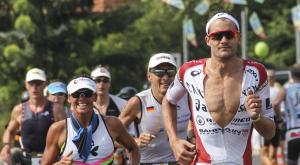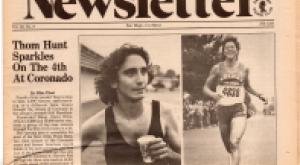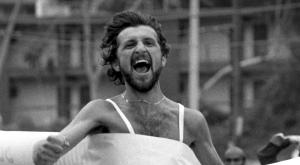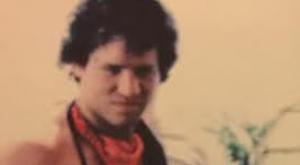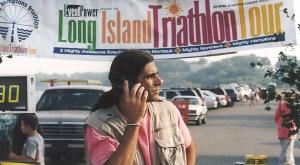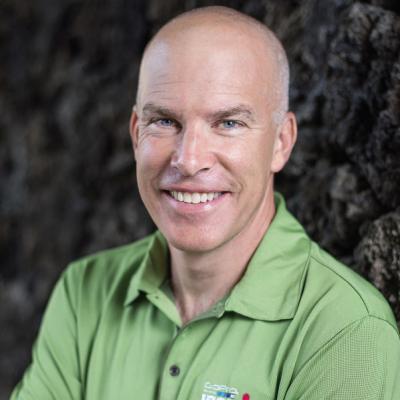
The Big Kahuna -- WTC CEO and Ironman-in-Chief Andrew Messick. "We have a responsibility to the institutional memory of the sport."
Where does Ironman, the Corporation, stand in the area of doing triathlon's history? What role do they take as stewards of the Ironman Dream? TriHistory.com's Scott Tinley asked World Triathlon Corporation's CEO, Andrew Messick, pointed questions about WTC's role.
ST: For many Ironmen and women, their first time crossing the finish line is held up along such lines of personal history with graduations, marriage, and childbirth. What is it like having that kind of responsibility to produce events that mean so much to these athletes?
AM: It's a heavy responsibility and one that we take very seriously and always have. The best part of the organization is that everyone always by and large operationally understood how important the race experience was and is; how important that finish line is to our athletes. We've always been--anywhere in the world--remarkably good at delivering an extraordinary, life changing Ironman experience. And that, as much as anything, is responsible for the vibrancy and strength of the brand because from the very beginning—the very beginning—we've always had extraordinary people do our races and people who perceive themeselves to be average don't accept the challenge. It's almost always people who are capable and willing and driven to accept the sacrifice that are drawn to the magnitude of the challenge. Ironman has always understood that the race experience has to be fabulous because these athletes take it so seriously. A key marketing component of Ironman is having extraordinary people doing our races, going home and telling everyone they know you have to do an Ironman before you die because it's that great of an experience. The training and preparation transforms people.
ST: Because of the increased levels of performance, sacrifices, and costs, has this (ability to offer transformation) changed in recent years? Certainly the (economic) demographics of Ironman competitors have risen.
AM: No, I don't think so. I think that the price of an Ironman has always been extremely low relative to the costs.
ST: Can you be more specific?
AM: What you pay for a registration is a tiny portion of the true cost of doing an Ironman. And the true costs relate to your sacrifices at work, your sacrifices to your family, and what it costs to get up at five in the morning to train...It's more the type of people we attract are the type that typically succeed at what they put their minds to...They hold the core values of what it takes to succeed: hard work, perseverance, effort.
ST: I'm wondering if you think that today's Ironman devotees relate to the events' or the brands' history as much as endurance athletes of an earlier generation. The sports sociologist, Dr. Harry Edwards argues that the current generation of elite and professional athletes do not know or care about a sport's history. Would you agree or not?
AM: So, I don't think I agree with that. And this is just me thinking. I'll tell you why I don't think I agree and then I'll you why I'm not sure. During Kona Week on Wednesday before the Aloha Reception we have a reception for one hundred Legacy Athletes. The Legacy Athlete Program is a way for slow people to race Kona once in their lifetime if they have established that they are long term serious members of the Ironman community. Last year we had Welchy, Paula, Dave Scott, Fernanda Keller and these guys knew who everyone was and were fired up to meet them...the attendees knew the stats of all these athletes. Those guys were remarkably dialed into the history of the sport. But I wasn't around ten years ago to know if the pool of Ironman athletes were more or less into the history then as opposed to now.
ST: Do you feel that WTC has a responsibility to document and promote the significant narratives that happen in Kona every year beyond the television and what requirement come with sponsorship agreements?
AM: I think that we have a responsibility that we have accepted reasonably well to be the institutional memory of the sport...This matters to us (WTC) and it matters to me as we talk about Ironman and efforts to make Ironman relevant. We spent a lot of time last year celebrating the 35th anniversary and so yeah, we have a lot of responsibility because if we don't do it, then who will? We are at a unique point in our history where we are old enough to have history but we're young enough to not be bound by it. If you take the sport of cycling, for example...the Tour de France and the Giro have been around over one hundred years which is great in some ways but terrible in others because their ability to innovate is dramatically limited. We don't enlist in the conventional federation structure and never have which has made it a lot easier for us to be able to innovate because ultimately we are not governed by a lot of...federation-based regulatory structures that govern what we can and can't do. That helps us to be more relevant. At the same time you also don't want to throw the baby out with the bath water and wash away some thirty five years of history and tradition; the things that (originally) made Ironman relevant and great.
ST: What about some of the other global Ironman event? Where do you see the best example of these races celebrating their own specific histories?
AM: I was down in New Zealand in March for their 30th and it was fantastic and my funny anecdote was that Ken Glah punched his ticket for his 31st Ironman in Kona. And you know who had to pass on the chance to go to Kona for Glah to gain the slot? Scott Molina.
ST: Wonderful story. So, do you see some kind of brand value (for Providence Equity or WTC) by adding more import to the history of all Ironman events? Most other professional sports have some kind of regular program in place that engages those athletes who have made the sport. Ironman seems unclear in their structured programs to connect with its rich history.
AM: Put aside Providence and WTC because ultimately the buck stops on my desk. And the answer is yes. We don't have the bandwidth to do every good thing; we are in a time right now where we can't chase every good idea. It's both encouraging and frustrating for me...it's encouraging because there are so many opportunities and frustrating because everywhere I look there are places that we can improve; things that we can do better...There's a time warp that can be done with history. We have control all of our media rights and all of our footage back to 1991. Before that ABC owns it from Wide World of Sports. We have more than twenty years of footage. We have great stories about age grouper and pros but we just haven't gotten around to tying those stories as comprehensively and frankly we are still a profoundly American organization. So, we talk about the great stories from Kona, the Hoyts and Julie Moss and everything that happens on our Kona show every year. We only do that in America. We don't have German media slots for that cancer survivor slot from the (Germany) Ironman. And we should. We still fundamentally look at American media stories and that is something that is going to change.
ST: It seems that up until now, a good part of the rich and organic history of the Ironman has been written by the individual--Mike Plant writing his canonical text, Iron Will in 1987, Bob Babbitt's First 25 Years of Ironman book, the owner of Kona Inn Jewelry collecting every Ironman poster since 1981, dozens if not hundreds of folks around the world who have all the television broadcasts on tape and in digital format—these are the true curators of the Ironman history.
AM: I now have John Collins' original Ironman finisher's shirt framed on the wall of my office.
ST: I'd also suggest that many of the original Ironman competitors from not only Hawaii but the men and women who raced in San Diego in the early 70s are in their mid to late 70s themselves and some are 80 something. I'd argue that the sport needs to chronicle their stories and their contributions before they leave us.
ST: For you personally, Andrew, what are your top three most signifying moments in Kona's history?
AM: The first two are Julie Moss (in 1982) and Dave and Mark in '89 and the third is wide open. It's wide open from Hellriegel winning to Paula winning eight times to Chrissie never having lost to the Hoyts to the great epic battles in the hand cycle between Moleda and David Baily. There are ten stories that are significant but they are below Julie, Mark, and Dave. I don't want to try and rank these, but I don't think enough people know about these stories.
ST: So, where does WTC look for new history?
AM: We're putting more and more effort and emphasis into the Ironman Hall of Fame. In my opinion it's an area that is under-marketed and under-leveraged and it something that we can and should do a better job with.


